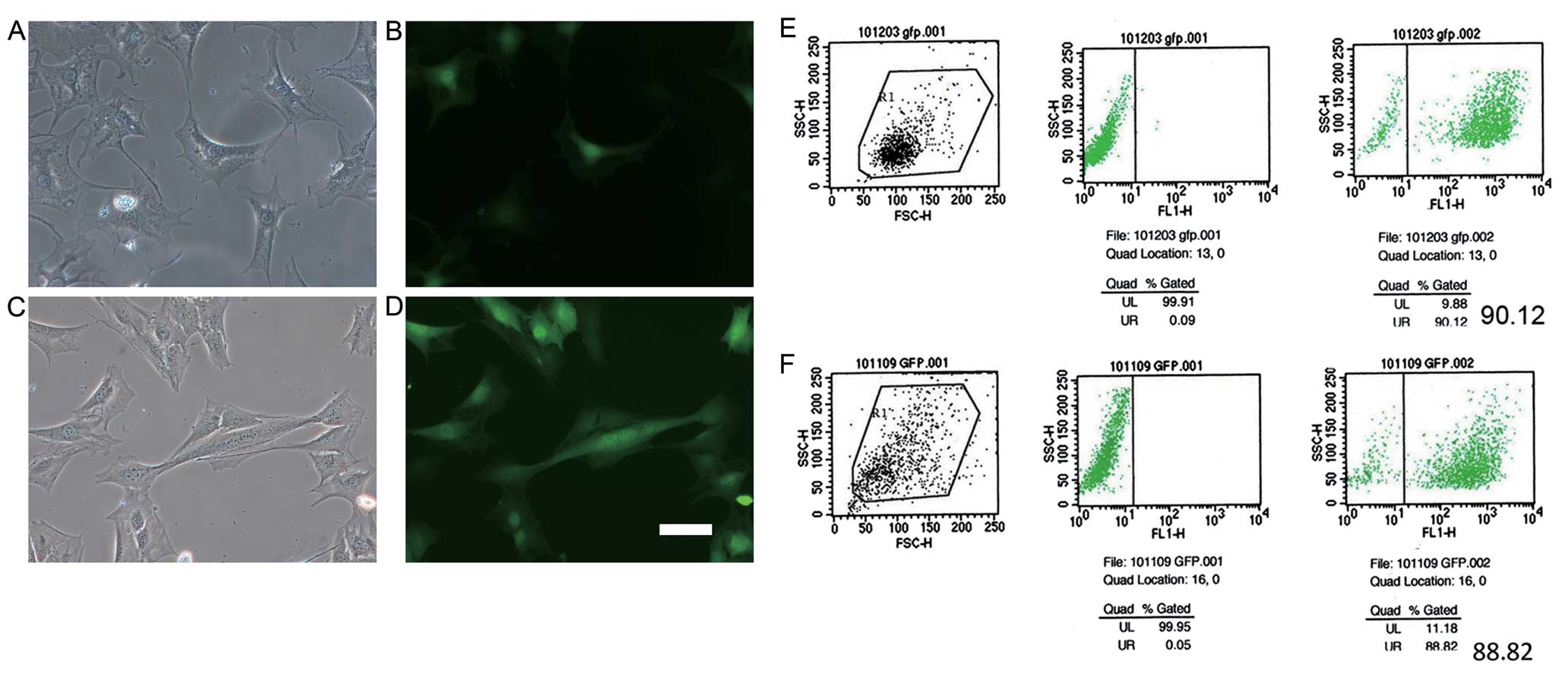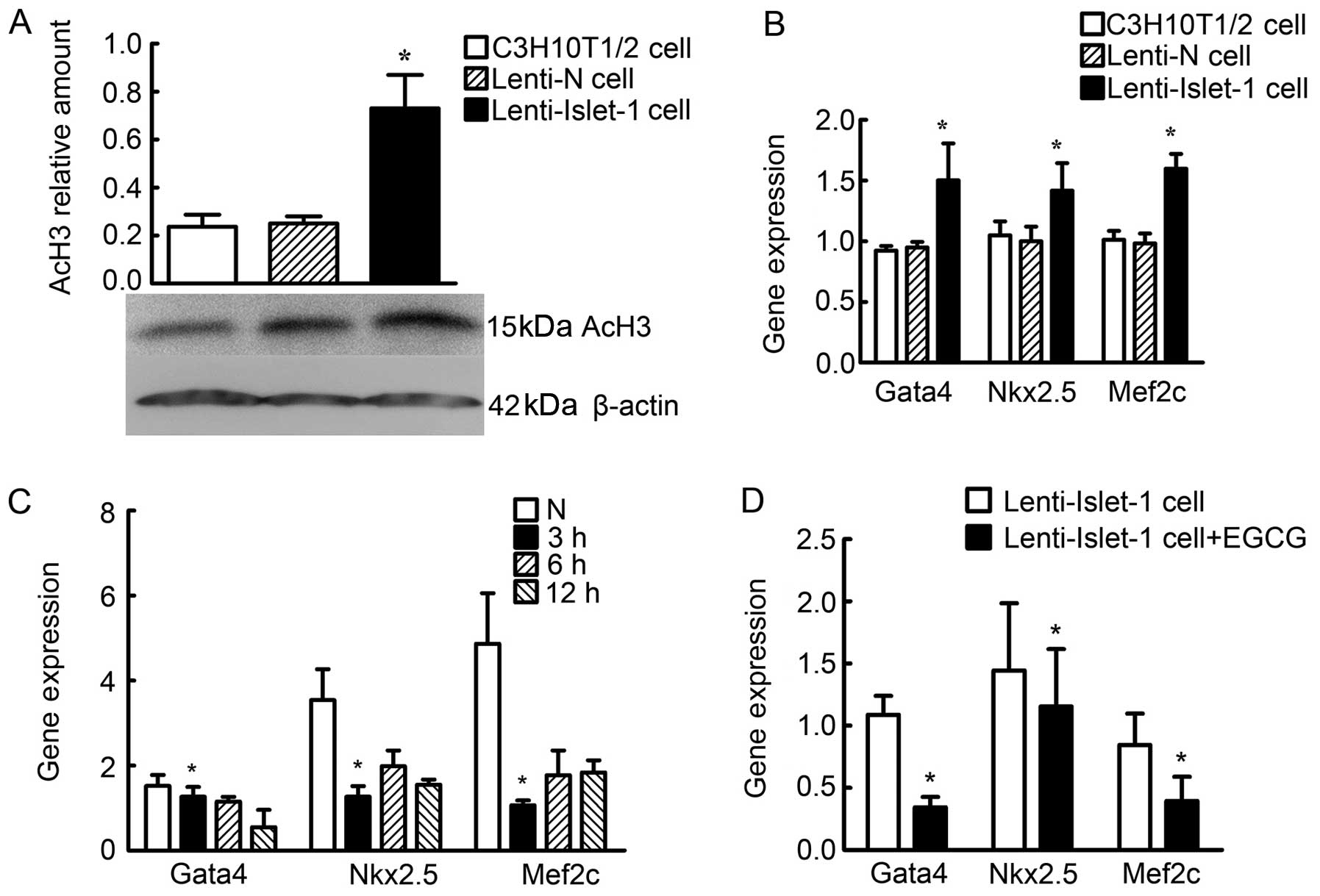|
1
|
Christoforou N and Gearhart JD: Stem cells
and their potential in cell-based cardiac therapies. Prog
Cardiovasc Dis. 49:396–413. 2007. View Article : Google Scholar : PubMed/NCBI
|
|
2
|
Bianco P, Robey PG and Simmons PJ:
Mesenchymal stem cells: revisiting history, concepts, and assays.
Cell Stem Cell. 2:313–319. 2008. View Article : Google Scholar : PubMed/NCBI
|
|
3
|
Pittenger MF, Mackay AM, Beck SC, et al:
Multilineage potential of adult human mesenchymal stem cells.
Science. 284:143–147. 1999. View Article : Google Scholar : PubMed/NCBI
|
|
4
|
Qin JJ, Xian SX, Huang XW and Sun JH:
Differentiation of mesenchymal stem cells into cardiomyocyte-like
cells in vitro: Drug, microenvironment and method. Zhongguo Zuzhi
Gongcheng Yanjiu Yu Linchuang Kangfu. 15:139–142. 2011.(In
Chinese).
|
|
5
|
Mafi1 P, Hindocha S, Mafi R, Griffin M and
Khan WS: Adult mesenchymal stem cells and cell surface
characterization - a systematic review of the literature. Open
Orthop J. 5:253–260. 2011. View Article : Google Scholar : PubMed/NCBI
|
|
6
|
Psaltis PJ, Zannettino AC, Worthley SG and
Gronthos S: Concise review: mesenchymal stromal cells: potential
for cardiovascular repair. Stem Cells. 26:2201–2210. 2008.
View Article : Google Scholar : PubMed/NCBI
|
|
7
|
Verdone L, Caserta M and Di Mauro E: Role
of histone acetylation in the control of gene expression.
Biochemistry and cell biology. Biochem Cell Biol. 83:344–353. 2005.
View Article : Google Scholar : PubMed/NCBI
|
|
8
|
Gupta MP, Samant SA, Smith SH and Shroff
SG: HDAC4 and PCAF bind to cardiac sarcomeres and play a role in
regulating myofilament contractile activity. J Biol Chem.
283:10135–10146. 2008. View Article : Google Scholar : PubMed/NCBI
|
|
9
|
Yang G, Tian J, Feng C, Zhao LL, Liu Z and
Zhu J: Trichostatin a promotes cardiomyocyte differentiation of rat
mesenchymal stem cells after 5-azacytidine induction or during
coculture with neonatal cardiomyocytes via a mechanism independent
of histone deacetylase inhibition. Cell Transplant. 21:985–996.
2012. View Article : Google Scholar
|
|
10
|
Shahbazian MD and Grunstein M: Functions
of site-specific histone acetylation and deacetylation. Annu Rev
Biochem. 76:75–100. 2007. View Article : Google Scholar : PubMed/NCBI
|
|
11
|
Wang Z, Zang C, Cui K, et al: Genome-wide
mapping of HATs and HDACs reveals distinct functions in active and
inactive genes. Cell. 138:1019–1031. 2009. View Article : Google Scholar : PubMed/NCBI
|
|
12
|
Brade T, Gessert S, Kühl M and Pandur P:
The amphibian second heart field: Xenopus islet-1 is required for
cardiovascular development. Dev Biol. 311:297–310. 2007. View Article : Google Scholar : PubMed/NCBI
|
|
13
|
Bu L, Jiang X, Martin-Puig S, et al: Human
ISL1 heart progenitors generate diverse multipotent cardiovascular
cell lineages. Nature. 460:113–117. 2009. View Article : Google Scholar : PubMed/NCBI
|
|
14
|
Yang L, Cai CL, Lin L, et al: Isl1Cre
reveals a common Bmp pathway in heart and limb development.
Development. 133:1575–1585. 2006. View Article : Google Scholar : PubMed/NCBI
|
|
15
|
Laugwitz KL, Moretti A, Caron L, Nakano A
and Chien KR: Islet1 cardiovascular progenitors: a single source
for heart lineages? Development. 135:193–205. 2008.PubMed/NCBI
|
|
16
|
Nakano A, Nakano H and Chien KR:
Multipotent islet-1 cardiovascular progenitors in development and
disease. Cold Spring Harb Symp Quant Biol. 73:297–306. 2008.
View Article : Google Scholar : PubMed/NCBI
|
|
17
|
Toscano MG, Frecha C, Ortega C, Santamaria
M, Martin F and Molina IJ: Efficient lentiviral transduction of
Herpesvirus saimiri immortalized T cells as a model for gene
therapy in primary immunodeficiencies. Gene Ther. 11:956–961.
2004.
|
|
18
|
Zsindely N, Pankotai T, Ujfaludi Z, et al:
The loss of histone H3 lysine 9 acetylation due to dSAGA-specific
dAda2b mutation influences the expression of only a small subset of
genes. Nucleic Acid Res. 37:6665–6680. 2009. View Article : Google Scholar : PubMed/NCBI
|
|
19
|
Carvalho PH, Daibert AP, Monteiro BS, et
al: Differentiation of adipose tissue-derived mesenchymal stem
cells into cardiomyocytes. Arq Bras Cardiol. 100:82–89.
2013.PubMed/NCBI
|
|
20
|
Haberzettl P, Lee J, Duggineni D, et al:
Exposure to ambient air fine particulate matter prevents
VEGF-induced mobilization of endothelial progenitor cells from the
bone marrow. Environ Health Perspect. 120:848–856. 2012. View Article : Google Scholar : PubMed/NCBI
|
|
21
|
Li Y, Chu JS, Kurpinski K, et al:
Biophysical regulation of histone acetylation in mesenchymal stem
cells. Biophys J. 100:1902–1909. 2011. View Article : Google Scholar : PubMed/NCBI
|
|
22
|
Passier R, Van Laake LW and Mummery CL:
Stem-cell-based therapy and lessons from the heart. Nature.
453:322–329. 2008. View Article : Google Scholar : PubMed/NCBI
|
|
23
|
Li L, Zhu J, Tian J, Liu X and Feng C: A
role for Gcn5 in cardiomyocyte differentiation of rat mesenchymal
stem cells. Mol Cell Biochem. 345:309–316. 2010. View Article : Google Scholar : PubMed/NCBI
|
|
24
|
Colussi C, Berni R, Rosati J, et al: The
histone deacetylase inhibitor suberoylanilide hydroxamic acid
reduces cardiac arrhythmias in dystrophic mice. Cardiovasc Res.
87:73–82. 2010. View Article : Google Scholar : PubMed/NCBI
|
|
25
|
Pufahl L, Katryniok C, Schnur N, et al:
Trichostatin A induces 5-lipoxygenase promoter activity and mRNA
expression via inhibition of histone deacetylase 2 and 3. J Cell
Mol Med. 16:1461–1473. 2012. View Article : Google Scholar : PubMed/NCBI
|
|
26
|
Grant PA, Duggan L, Côté J, et al: Yeast
Gcn5 functions in two multisubunit complexes to acetylate
nucleosomal histones: characterization of an Ada complex and the
SAGA (Spt/Ada) complex. Genes Dev. 11:1640–1650. 1997. View Article : Google Scholar : PubMed/NCBI
|
|
27
|
Chakraborty A, Paul BD and Nagaraja V:
Bacteriophage Mu C protein is a new member of unusual leucine
zipper-HTH class of proteins. Protein Eng Des Sel. 20:1–5. 2007.
View Article : Google Scholar : PubMed/NCBI
|
|
28
|
Kosaka N, Kodama M, Sasaki H, et al: FGF-4
regulates neural progenitor cell proliferation and neuronal
differentiation. FASEB J. 20:1484–1485. 2006. View Article : Google Scholar : PubMed/NCBI
|
|
29
|
Mishra R, Vijayan K, Colletti EJ, et al:
Characterization and functionality of cardiac progenitor cells in
congenital heart patients. Circulation. 123:364–373. 2011.
View Article : Google Scholar : PubMed/NCBI
|
|
30
|
Moretti A, Bellin M, Jung CB, et al: Mouse
and human induced pluripotent stem cells as a source for
multipotent Isl1+cardiovascular progenitors. FASEB J.
24:700–711. 2010.PubMed/NCBI
|



















